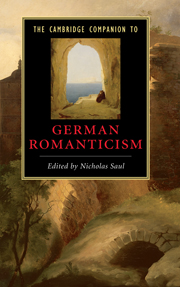Book contents
- Frontmatter
- 1 What is Romanticism, and where did it come from?
- 2 From early to late Romanticism
- 3 Prose fiction of the German Romantics
- 4 The Romantic lyric
- 5 The Romantic drama
- 6 Forms and objectives of Romantic criticism
- 7 Romanticism and Classicism
- 8 Women writers and Romanticism
- 9 The Romantics and other cultures
- 10 Love, death and Liebestod in German Romanticism
- 11 Romantic philosophy and religion
- 12 Romantic politics and society
- 13 Romantic science and psychology
- 14 German Romantic painters
- 15 Romanticism and music
- 16 Transformations of German Romanticism 1830-2000
- Key authors and their works
- Further reading
- Index
9 - The Romantics and other cultures
Published online by Cambridge University Press: 28 September 2010
- Frontmatter
- 1 What is Romanticism, and where did it come from?
- 2 From early to late Romanticism
- 3 Prose fiction of the German Romantics
- 4 The Romantic lyric
- 5 The Romantic drama
- 6 Forms and objectives of Romantic criticism
- 7 Romanticism and Classicism
- 8 Women writers and Romanticism
- 9 The Romantics and other cultures
- 10 Love, death and Liebestod in German Romanticism
- 11 Romantic philosophy and religion
- 12 Romantic politics and society
- 13 Romantic science and psychology
- 14 German Romantic painters
- 15 Romanticism and music
- 16 Transformations of German Romanticism 1830-2000
- Key authors and their works
- Further reading
- Index
Summary
Isaiah Berlin has argued that Johann Gottfried Herder (1744-1803) introduced a notion of pluralism into German intellectual and cultural history that was profoundly innovative and of great consequence for later generations, in particular the Romantics. Berlin defines Herder's concept of pluralism as not only the belief in the 'multiplicity', but in the 'incommensurability, of the values of different cultures and societies, and in addition, in the incompatibility of equally valid ideals'. Following Herder's trajectory, the Romantics rejected what they perceived as the Enlightenment's outdated emphasis on universalism to embrace a notion of alterity that, at least on the surface, seemed to be more open to 'irrational' elements in the world views and belief systems of other cultures. Berlin's assessment has found widespread support and in fact, one could argue, the idea that cultural pluralism is a counter-Enlightenment phenomenon represents the consensus of the field. This chapter will revisit the issue of Romantic pluralism and revise Berlin's theories. One problem is that Berlin, and many other scholars after him, highlights the importance of Herder's 1774 essay Auch eine Philosophie der Geschichte zur Bildung der Menschheit ( Another Philosophy of History for the Cultivation of Humanity), with its emphasis on the incompatibility of cultures and the significance of cultural differences, but neglects the importance of Herder's four-volume Ideen zur Philosophie der Geschichte der Menschheit (1784-91; Ideas on the Philosophy of History of Humanity).
- Type
- Chapter
- Information
- The Cambridge Companion to German Romanticism , pp. 147 - 162Publisher: Cambridge University PressPrint publication year: 2009
- 4
- Cited by



